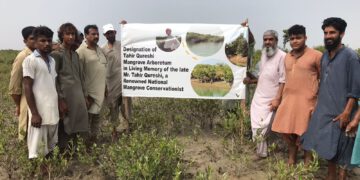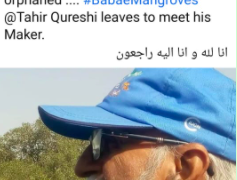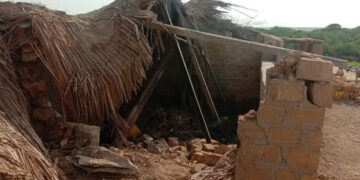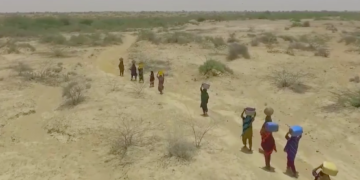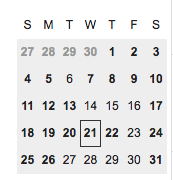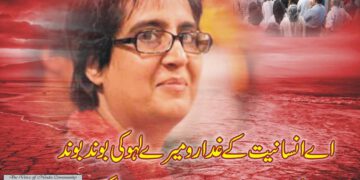I sat up with a start when I heard in the news that it was raining heavily in Thatta. This spelled trouble for the two communities I had been interacting with on behalf of the humanitarian organisation I worked for. They had been displaced after the 2010 floods, and were occupying a vacant piece of land, waiting to be resettled in permanent shelters.
I called ahead to find out their plight, and sure enough was told that their makeshift thatch huts had collapsed, and that all their land was under water. Luckily, we had anticipated another spell of severe monsoon rains, so had prepared some emergency hampers with food and hygiene items that we immediately loaded onto a truck, and headed off to Sujawal.
It was distressing to see people homeless again who had only just started picking up the pieces of their lives after last year’s disaster. They moved with their rag-tag belongings from one building to another, finding shelter in schools. We could at best provide temporary relief.
However, worse was to follow. Just a couple of days later, torrential rains resulted in breaches to the agricultural run-off drains in Jati, and people from that area also streamed into Sujawal, looking for shelter and relief.
With the help of the district administration we could still just about manage this in-flow of people. But what followed in the next few days threw every arrangement out of gear. The havoc caused by the breaches and the overtopping of the contentious and controversial Left Bank Outfall Drain in Badin inundated vast swathes of farmland, completely destroying the standing crops of cotton, sugarcane, rice and fodder.
Driving to Badin city and onwards, my heart sank deeper as I witnessed the scale of the devastation and the desolate, desperate faces of people on the side of the road, sitting under makeshift shelters that were barely wide enough to hold their cots.
The situation was even worse on the inner roads. All one could see were inundated fields, collapsed houses, and people begging for help, looking for a roof over their heads to save them from the relentless rain. There were people who waded through chest-high waters to come to the relief distribution points. At places, one had to offload relief supplies from trucks onto smaller vehicles and then onto boats to get them to affected communities.
My rudimentary understanding of the Sindhi language was no barrier to understanding the expressions that were writ large on the faces of the tottering old men, and women with babies already suffering from skin infections. The extended monsoon has water-logged entire districts, and although the rains have now stopped, poor drainage planning means that the water will remain on the lands for at least another couple of months.
Having lost this cropping season to the disaster, the farmers do not hope to reap a harvest in the next season either, as the land will still not be ready for cultivation.
Whichever way you look at it, it is a disaster on an unprecedented scale – a human disaster, an economic disaster, and now a health disaster due to the outbreak of water-borne and malarial diseases.
I would like to see climate change deniers explain away erratic monsoon patterns, as well as the ferocity of the rains that have wreaked this havoc.
More than that, one needs tonnes of determination to deal with the current crisis, and also to prepare contingency plans that work much more effectively in the future.
http://www.trust.org/item/20111021145500-spzjg/?source=search

